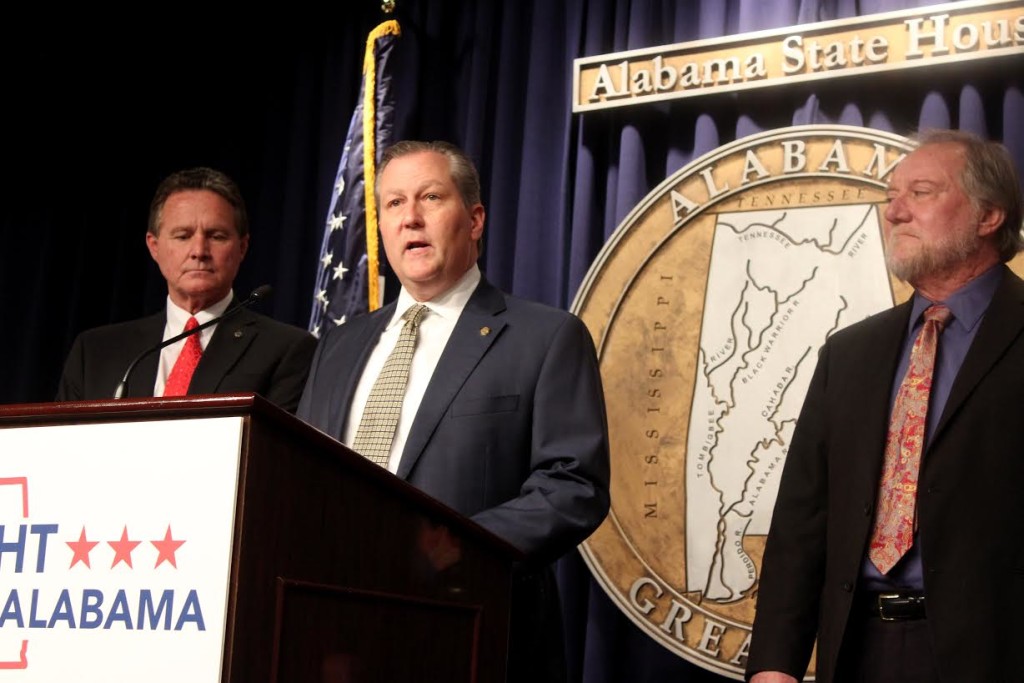Bradley Byrne: We must rein in overreach at the Department of Labor

A big problem with our country today is that the government and federal bureaucrats always seem to think they know what is best. This is flawed logic because government was created to serve the people, not the other way around. Unfortunately, government agencies seem to forget that. This is certainly true when it comes to the Department of Labor and the National Labor Relations Board. The National Labor Relations Board (NLRB) is an independent federal agency responsible for setting policies related to labor practices and unions. The NLRB was formed in 1935, but has seen its power increase in recent years. The Department of Labor and the NLRB exist for the purpose of protecting American workers. Unfortunately, they have abused their powers in an effort to exert more control over businesses and workers. The Obama Administration has used the Department of Labor and the NLRB to upend decades of legal precedent by issuing aggressive decisions and regulations. Sadly, these actions have put the interests of big labor bosses ahead of what is best for hardworking Americans. These actions are especially challenging to small and medium sized businesses who lack the money and resources to devote to compliance with the patchwork of federal laws, regulations, policies, and decisions. I hear far too often from small businesses right here in Southwest Alabama who have been negatively impacted by the Obama Administration’s labor policy. As a member of the House Education and the Workforce Committee, I have been working to fight back against this overreach and abuse. The Committee has held numerous hearings on labor issues, including a field hearing last August in Mobile. We have also passed legislation that would block some of the most onerous proposals from moving forward, but many of our bills have been vetoed by President Obama. So, we must find ways to work around the President’s veto pen. One of the most powerful tools we have in Congress is the power of the purse. Almost all federal agencies and programs require funding from Congress. If the Obama Administration isn’t following the law or is overreaching, we should cut or withhold funding to the related agency. With this in mind, I recently sent a letter to the House Appropriations Committee, which is responsible for writing the annual funding bills, asking that they address four major labor issues in this year’s funding legislation. I was honored to have 72 of my Republican colleagues from every corner of the United States sign my letter to show strong support for reining in overreach by the Department of Labor and the NLRB. That shouldn’t be where we stop though. We must continue pushing for standalone legislation to protect worker rights and ensure fairness in the workplace. I am especially proud to support the Employee Rights Act. The Employee Rights Act would make wholesale reforms to bring our nation’s labor laws up to date. Among the many reforms, this bill would guarantee secret ballot votes on any initial decision to join a union, require unions to get positive consent from members before using union fees for political purposes, and protect employees against union intimidation or retaliation. An appropriate union-employee relationship is critical to having a strong economy. We should always ensure that hardworking Americans and small business owners, not big union bosses, are deciding what is best for their business. I promise you this: I will continue fighting every day against overreaches by the Obama Administration and keep working to protect American workers. That is what you elected me to do. • • • Bradley Byrne is a member of U.S. Congress representing Alabama’s 1st Congressional District.
Right-to-work amendment passed in Alabama Senate

The Alabama Senate has passed legislation reiterating Alabama’s position as a so-called “right-to-work” state. Senators on Thursday passed the amendment 25 votes to 9. Alabama voters will now have the chance to approve the amendment at the ballot box. Right-to-work states prohibit companies from requiring workers to pay union dues as a condition of employment. Alabama law already has the prohibition, but Republicans said adding the amendment to the state Constitution will give businesses additional assurances. In a debate on the Senate floor, Minority Leader Quinton Ross, a Democrat, called the amendment “asinine” and a waste of time and money. Ross says lawmakers have more important issues they should address. Republished with permission of the Associated Press.
Vote on ‘Right to Work’ amendment stalls in Senate

A bill, which would put the idea of cementing Alabama’s status as a “Right to Work” state in constitutional statute up for a vote, stalled in the Alabama Senate Thursday as lawmakers attempted to make progress on less contentious issues. Alabama’s status as a “Right to Work” state is already enshrined as a statute, but this legislation would secure it via constitutional amendment. HB37 from Rep. Arnold Mooney (R-Birmingham) has already passed the Senate, despite efforts by Democrats to derail the bill. In fact, Democrats succeeded in voting down the bill on a day that many House Republicans were absent, but the bill was brought up for reconsideration on a day when Republicans were better represented and passed by large margins. When it was brought up on the Senate floor Thursday by Sen. Gerald Dial (R-Lineville), it was immediately opposed by Sen. Bobby Singleton (D-Greensboro). Singleton railed against the legislation, saying the term “Right to Work” is misleading. “It’s says to Alabama workers that we want you to be on edge every day,” Singleton said. “The ‘Right to Work’ should be called the ‘Right to Fire.’ It is totally unfair to working class Alabamians.” Much the same argument was made by House Democrats, who said that the bill is a “union-busting” measure and overlooks the needs of Alabama workers in favor of incoming industries. But proponents argue that Alabama’s status as a “Right to Work” state has worked wonders in attracting jobs to the state, via large corporations like Polaris and Hyundai. Securing that status in the state’s oversized constitution would make it harder to upend in later years. Dial noted that the effort was part of House Republicans’ agenda. “It tells the world that Alabama is open for business,” Dial said. After a brief exchange between Singleton and Dial, Senate Pro Tem Del Marsh (R-Anniston) implored the Senators to carry the bill over so that action could be taken on other legislation. Senators agreed and a vote was delayed.
William J. Canary: State and federal proposals will provide a fair, level playing field for all Alabama workers

Article I of Alabama’s 1901 Constitution guarantees certain unique rights to our citizens. In addition to mirroring constitutional guarantees in the U.S. Bill of Rights, Alabama’s governing document bestows the right to have civil disputes heard in a court of law, the right to avoid imprisonment because of outstanding debts, and even the right to freely navigate public streams and waters. Missing among these, however, is one of the most important and fundamental rights for most of us – the right to work and provide for our families. The Alabama Legislature is working to correct that oversight. During a high-water mark of labor union activity more than 60 years ago, legislators in Montgomery noticed some disturbing trends. Non-union workers in certain plants, factories, and industries were being intimidated or pushed out by union members who wanted a “closed shop” workplace, and potential industrial prospects were reluctant to locate here in order to avoid the sometimes outrageous demands of organized labor. To combat these threats to our economic development progress, in 1953 the Legislature passed a right-to-work statute. But today, we are seeing history repeat itself as union activity is once again on the rise and threatening our ability to create jobs and opportunity. Just two months ago, the United Auto Workers were able to gain a foothold in organizing the Volkswagen plant in Chattanooga, Tenn. Closer to home, workers at the Golden Dragon Copper facility in Wilcox County moved to join the United Steelworkers union by a razor-thin 75-74 vote. As a result, it is time for Alabama to enshrine the right to work in our Constitution and send a loud message to economic developers and potential industrial prospects that we remain open for business. The provisions of the amendment are simple: it further establishes Alabama as a right-to-work state with constitutional protections that prevent labor organizations from forcing employees to join. At the same time, the amendment prevents employers from denying union membership to workers who wish to join. In some states, labor unions force non-union employees to pay a “fee” in lieu of membership dues because they, too, could potentially benefit from any collective bargaining negotiations with management. Alabama’s proposed constitutional amendment prohibits that practice. The measure also prohibits labor unions from creating monopolies and preventing other organized labor groups from representing workers. The Alabama House has passed the constitutional amendment and sent it to the Senate for consideration. If approved, the amendment will appear on the November 2016 General Election ballot for ratification. Similar efforts on the federal level are progressing. America’s labor laws have not been substantively reformed since 1947, but our nation’s economy and workforce have since changed significantly. For that reason, the federal Employee Rights Act seeks to pull American labor relations firmly into the 21st Century. Because of its commonsense reforms, the Employee Rights Act commands strong cross-party appeal and enjoys high favorability, even in union households. Currently, union members have to opt out of seeing their union dues used for political purposes, and they are often forced to give up certain workplace protections in the process. Far too often, union members see their dues being used to support the election of candidates who are on the opposite extreme of their own political leanings. This federal proposal would make political spending purely optional and require unions to get positive consent from members before proceeding rather than requiring them to opt out. It also guarantees secret ballot votes on any initial decision to join a union, which means employees can vote their consciences without fear of reprisal from union bosses. Both of these fair, reasonable, and level-headed measures being considered by the Legislature and Congress are designed to ensure that union and non-union workers and businesses may peacefully coexist in a calm workplace environment, which will help grow new investments, new jobs, and new opportunities. Because without jobs and the workers they require, the question of union or non-union quickly becomes moot. William J. Canary is President and CEO of the Business Council of Alabama.
House members clash over 2 Republican-sponsored bills

House Democrats started today’s session by fighting vehemently against a bill brought forth by Rep. Arnold Mooney (R-Birmingham), HB37, which would add Alabama’s status as a “Right-to-Work” to the state constitution. The bill would further prohibit employers from requiring membership in a union or dismissing employees for their status as a union or non-union member. Though a handful of House Republicans spoke in favor of the bill, noting that Alabama’s status as a “Right-to-Work” state has attracted large businesses like Polaris and Mercedes, the vast majority of comment on the bill came from House Democrats in opposition to the bill. Members of the party took turns at the podium, stalling a vote on the bill for more than two hours. “I know y’all call it ‘right to work,’ but it’s really ‘right to fire,’” Rep. John Rogers (D-Birmingham) said. Several other opponents noted that Alabama is already a “Right-to-Work” state by statute and wondered why there was a need for the bill. Mooney clarified that having Alabama’s “Right-to-Work” status codified in the constitution would encourage more businesses to locate to Alabama. Rep. Patricia Todd (D-Birmingham) also voiced opposition to the bill over the fact that Alabama’s constitution is already among the longest in the world, saying that while other states can carry a pocket-sized version of their constitution Alabamians would “need a cart to carry our constitution around.” Rep. John Knight (D-Montgomery) concurred, adding that there are many issues that are more deserving of codification in the state constitution. Knight offered an amendment to the bill guiding new businesses to give preferential hiring treatment to veterans. “This will send a strong message to veterans across this state that we support them,” Knight said before the amendment was approved, 67 to 28. According to statistics from the Bureau of Labor Statistics, the three states with the lowest unemployment rates in the nation, North Dakota, Nebraska and South Dakota, are “Right-to-Work” states. Contrarily, the states with the highest unemployment rates in the nation, New Mexico, the District of Columbia and Alaska, are not. After a bit more discussion, Mooney’s bill was defeated by a margin of 60 to 24. Next the House took up HB45 from Rep. April Weaver (R-Shelby), which outlaws the sell of fetal tissue and provides parents with the right to respectfully dispose of a deceased child’s remains. Again only a few comments were made in support of the bill with the majority of comment coming from opposing Democrats, especially those who linked the legislation to the recently debunked Planned Parenthood sting videos. “I’m not going to argue the merits for or against abortion,” Todd said. “But I am going to point out the hypocrisy of this bill. It seems like (Republicans) only care about those nine months when they’re in the womb.” Todd added that the House should take up measures to ensure that children aren’t forced to live in poverty or go without basic needs. Though debate on the bill had not yet completed, the House adjourned until 1 p.m. Tuesday.
Republican leaders outline 2016 “Right for Alabama” agenda

Alabama Speaker of the House Mike Hubbard (R-Auburn), alongside Majority Leader Micky Hammon (R-Decatur) and Rep. Donnie Chesteen (R-Geneva), held a press conference Thursday to lay out the Republican agenda for the upcoming legislative session. Titled “Right for Alabama,” the agenda lays out state Republicans’ priorities for the upcoming session. “Our ‘Right for Alabama’ agenda focuses on important issues like job creation, protecting public school students from harm, demanding the dignity that unborn life deserves, and other vital initiatives,” Hubbard said in a press release. “It also continues Alabama’s on-going fight against wrong-headed federal policies that would erode our constitutionally protected gun rights and force the state to accept thousands of potentially dangerous and unchecked Syrian refugees.” The first item on the agenda, and the one that all three legislators agree is most important, is a “zero-based budgeting reform,” which requires state agencies to account for each dollar received, identify ineffective programs and save or redirect taxpayer money. According to Hubbard, both the general fund and education budgets will be the first items addressed in the upcoming session. State Republicans also planb to address pension reform in an effort to “ensure the long-term solvency and fiscal health of the Retirement Systems of Alabama” and preserve the current level of benefits retirees earn. The Alabama Taxpayer Advocate Act would change a current statute, which requires the Alabama Department of Revenue to select a person from its ranks to serve as Taxpayer Advocate, to allow the governor to select the advocate from a pool of qualified candidates. The Small Business Job Creation Tax Credit would provide a $1,500 tax to small businesses for “every new, qualified employee hired by small businesses operating within the state.” Alabama’s Right to Work Constitutional Amendment will enshrine Alabama’s status as a “Right to Work” within the state constitution, declaring that Alabama is “open for business.” Republicans will also offer legislation aimed at “protecting public safety from Syrian refugee threats” and will assist members of the national Republican Party in “overturning Brack Obama’s unconstitutional executive orders attacking out Second Amendment right to own firearms.” Republicans also plan to create a School Security and Student Safety Task Force, made up of education, law enforcement and emergency management officials, to conduct a “comprehensive review and assessment of state laws, regulations, and protocols relating to security and student safety.” Though none of the legislators present would specify the amount, state Republicans also plan to work on providing teachers with a pay raise and establish the Wireless Infrastructure Renovation for Education (WIRED) Act, which provide grants to local school systems for the “purchase, installation or upgrade of wireless infrastructure.” If successful, Alabama will become the first state in the nation to have wireless infrastructure at all of its schools. Last on Republicans’ agenda is the Unborn Infants’ Dignity of Life Act, which will outlaw “the sale of the bodily remains of unborn infants.”

